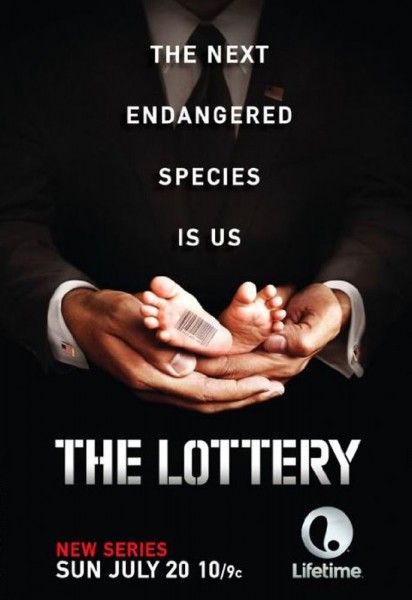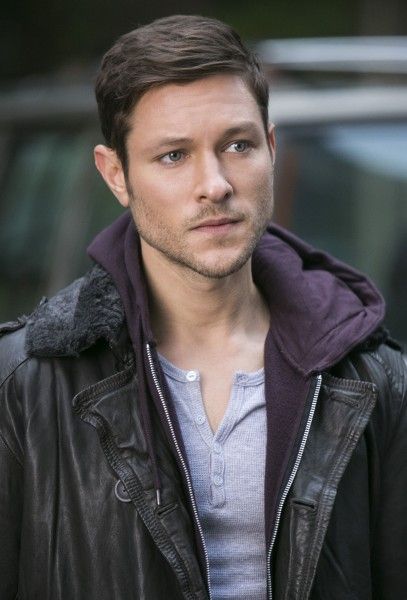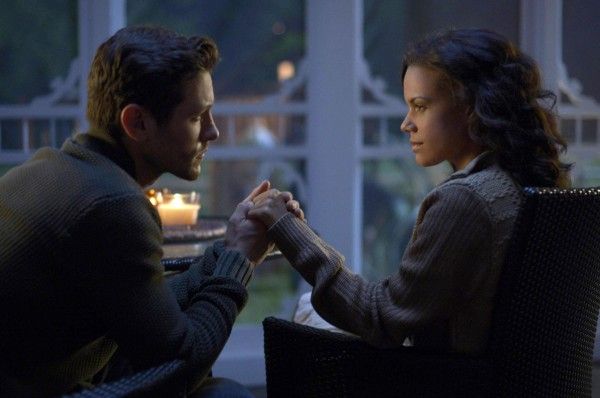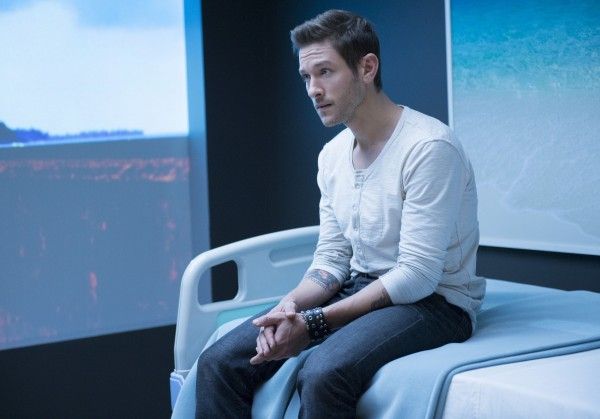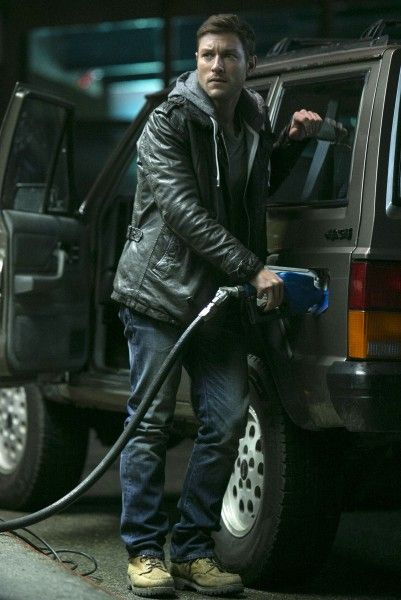From executive producer/writer Timothy J. Sexton (Children of Men), the Lifetime drama series The Lottery is set in a dystopian future driven by a global fertility crisis, after women mysteriously stopped bearing children. Dr. Alison Lennon (Marley Shelton) and her team have spent years researching to finally successfully fertilize 100 embryos that will be available to women through a national lottery conducted by the President of the United States (Yul Vazquez). The show also stars Martin Donovan, Athena Karkanis, David Alpay and Shelley Conn.
During this exclusive phone interview with Collider, actor Michael Graziadei (who plays Kyle, a recovering alcoholic and single father of one of the last children born in the country) talked about how he came to be a part of The Lottery, what appealed to him about this story, how exciting it is to be on a network that is pushing boundaries and taking risks in their storytelling, the successful blend of politics with science and humanity, the show’s take on future technology, how he approached playing and understanding this character, and working with this cast. He also talked about what it was like to be a part of the first season of American Horror Story and work with Jessica Lange, and going through acting boot camp for the years that he was a part of the popular soap opera The Young and the Restless. Check out what he had to say after the jump, and be aware that there are some spoilers.
Collider: How did you come to this show?
MICHAEL GRAZIADEI: I read the script, and it was one of my favorite scripts that I’d read in about five years. I was like, “This has a Children of Men feel to it,” without realizing that Tim Sexton had written it, which proved to be quite funny, once I did realize that. Once I got into the process and started auditioning and tested, they wanted to hire me on for the project, and it was a no-brainer for me that I wanted to work on that project, as well.
Were there specific things about this story that appealed to you?
GRAZIADEI: Because it’s not so far down the line in the future, it does feel a lot like our world. Also, having that little bit of sci-fi, it still also is something that feels like it could be something that’s very possible.
How exciting is it to be a part of a show on Lifetime, at a time when the network is really looking to push their boundaries and take risks in storytelling that they’ve never taken before?
GRAZIADEI: That’s actually one of the most exciting things about it. To be a part of a project that the network is behind, 100%, and they’re pushing it because they’re making these changes and stepping in a different direction with some programming, is always fun. You get a little more leeway and a little more room to play when you’re working on a project like that.
This is a very interesting version of the future to explore because it makes you wonder about the end of existence, which is something that most people try not to think about.
GRAZIADEI: Sure, we don’t want to think about our own mortality.
What have you found most interesting about this world that these characters are living in, as you’re telling this story and peeling back the layers of each script?
GRAZIADEI: To be completely honest with you, I love all of the government conspiracy stuff. I love all of the shady backroom White House dealings that are going on, and all of the politics involved. That kind of stuff is just fascinating to me.
The show seems to have found a great blend between the politics, the science and the humanity of it all that really helps audiences be able to identify with this story.
GRAZIADEI: You know, it does. Even with my storyline, you get the whole family aspect with the relationship between my character and his son is super relatable for people. If they don’t understand any of the other stuff, at one point, they’ve been a child or they have children.
Are you surprised that the futuristic technology is really just in the background of the story, and isn’t more of a focus?
GRAZIADEI: I think that they’ve been trying to figure out that balance and skirt that line. I know that they wanted to hint at how things could be different in the future, but I don’t think they really want to focus on the gadgets. We do have a few interesting things. I love the see-thru iPads and iPhones. It’s just something that’s already integrated into society and is part of the norm, instead of these crazy, jaw-dropping things that we would be using. Sometimes when we’re shooting stuff, we don’t know what they’re going to do in post. So, it’s always interesting to see where they go with it, once they get the final product out there.
You’re playing the father of one of the last six naturally-born children on the planet, which is a huge responsibility, especially for this single guy who clearly has problems of his own. How did you approach playing this character and understanding what this life would be like for someone like him?
GRAZIADEI: Going from the alcoholic aspect, I’ve taken friends to 12-step meetings, so that was something I could draw from. Knowing their experiences and hearing people’s stories in those meetings and seeing people struggle with those demons, you get a sense of what that would be like for yourself, and then you try to figure out some substitution for it. With having one of the last children and that responsibility, it makes the stakes even higher. He winds up under so much scrutiny by all these women who would love to have a child and can’t, and here’s this single recovering alcoholic father wandering around with one of the last kids. The government has got him under the magnifying glass. As far as the father and son relationships, I have a god-daughter that I would absolutely do anything for. I’m not gonna lie, a lot of times, I’ve thought about my dog. I have a dog at home, and that’s my baby. She’s my girl, and I would do absolutely anything for her. She’s like a child to me. I definitely want children in the future, but for now, those are the relationships I have to draw on, to try to figure this whole dynamic out.
When you’re playing a character who is a single father, the relationship between father and son is crucial to the emotionality of the show. What’s it been like to work with Jesse Filkow, who plays Elvis?
GRAZIADEI: Jesse Filkow is just a joy to have on set. He’s just completely untainted. Everything is just so raw and so natural and so innocent, and he takes direction so well. We spent a lot of time off set, goofing around. I think that he gets that I’m just a big kid at heart, so we were able to make a connection and form a bond, and I think that comes across on screen.
Without revealing anything, what can you say about what’s to come from your character and his journey, this season?
GRAZIADEI: I don’t think I can tell you anything about what’s to come with the story without getting in trouble. Kyle is going to face great trials and tribulations throughout the season.
How hard is it for these people to have just a little sliver of hope, with these 100 fertilized embryos that they may never be able to replicate?
GRAZIADEI: I think any hope is better than being completely hopeless. Those 100 embryos really do represent something that people can latch onto and say, “Maybe there is a cure for this, in the future. Maybe there is a solution to us facing our own extinction.”
We’ve already seen an attempt at extortion for some of those embryos. Is that something that will continue to happen?
GRAZIADEI: That’s absolutely something that I think is going to continue to happen. It might even be happening in my very own storyline. That’s absolutely something that I think is going to be central and integral to the show. Whoever controls those embryos has the power, so it becomes a great point of contention for everyone to struggle over and try to gain the upper hand on.
With everyone having their own agenda, who do you think has the welfare of these potential children in mind?
GRAZIADEI: I don’t know if we’ll ever find that out. That’s what makes for good television, though. The show forces us to look at some of these topics that we may not usually address, or we may have only looked at from a certain point of view. It forces us to ask ourselves the question, “What if?”
When you’re doing a show like this, where you’re really creating your own world, do you think it works to your own benefit that you had to relocate to Montreal and immerse yourself in a world that was kind of foreign to you?
GRAZIADEI: I think that absolutely helps, 100%. Uprooting myself from Los Angeles, and being away from friends and family, provides me with the tools necessary to be focused on this project and not have any distractions.
What’s it been like to work with this cast of actors, especially Marley Shelton?
GRAZIADEI: I could not be happier with the cast that they hired for this show. We really have something special, with Marley, with Martin Donovan, and with Yul Vazquez. I’ve been having a blast working with Marley, and I’m just waiting for the day that I get to work with Martin and Yul, as well. I not only respect them as actors, but they’re wonderful people, too. We’re very fortunate. That doesn’t always happen with a cast.
What was it like to get in on the ground floor of American Horror Story, before anyone knew what to expect from the show, including the actors who signed on?
GRAZIADEI: Yeah, I had no idea what to expect when I was doing it. That was another situation like what I’m currently doing. We had so much freedom to explore and do something different, and we didn’t have anybody telling us what we could or could not do while we were working on that show. We were always pushing it and going further. And of course, working with Jessica Lange really taught me a lot about conducting myself on a set and taking risks and not being scared to really try something different and not be afraid of it. That was probably one of the most creative projects I’ve done, since starting in this industry. I’m sure you’ve heard tons of actors say this, but I really don’t like sitting down and watching myself. I really love what I do. I go to work and do it, and then I put it down and walk away. But with American Horror Story, every week, my manager would come over and we’d go for a run, and then we would sit down and watch the show. I was hooked on it. I read the first script and wanted to call a therapist immediately. I was really excited and terrified, at the same time, to see what the rest of the season was going to hold for me and everyone else.
Every actor that’s spent time on a soap opera talks about what a great training ground they are, but they’re also a very different style of acting than any other kind of acting. Were there things that you feel you learned about acting, from the time you spent on The Young and the Restless, that you apply to what you do now?
GRAZIADEI: Absolutely! Soaps are really like boot camp for acting. They are their own animal. For myself, that was the first big job that I had. The people at The Young and the Restless and the people at CBS were just amazing to me, the whole time I was there. I think I was very fortunate to learn the things that I did learn. You learn about the industry, you learn about being on stage, and you learn about showing up on time. The sheer volume of work that we were given, on a daily basis, blows your mind and forces you to really work that muscle of memorization and just being able to change things on your feet. I think that’s paid off in spades for me. It’s been so beneficial.
Knowing how difficult it can be to get continuous work in this business, was it hard to make that decision to leave the show and walk away from a steady gig, not knowing what was next?
GRAZIADEI: It’s always hard to walk away from a steady gig. With them, I knew that I was getting a paycheck every week, and that could have been something that made it really easy for me to not leave. However, it was just time. I felt like I had learned everything I could possibly learn there, and I had done everything I could possibly do there, with that character, and I wanted to go play new characters. I had to just take that leap of faith, and believe in myself, as well.
The Lottery airs on Sunday nights on Lifetime.


